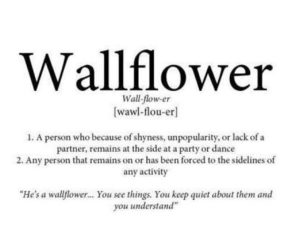Sample Pages
Chapter 1: No One Wants to be a Wallflower
Why more and more people are identifying themselves as wallflowers
Do you wait in the wings; unable to participate in the way you want to, feeling deep down there is another “you” that is longing to come out? Even if you are in the centre of the room, it feels as if you are hugging the edges of the room, shut off from everyone else – invisible, unseen and unnoticed – and yet glaringly visible.
“Everyone can see you being so quiet,” the voice in your head is continuously telling you. “They can see just how ridiculous you look. They’re wondering why you aren’t saying something. They’re looking at you expecting you to say something, and you’re still not saying anything. But if you say something now they’ll think it sounds stupid and that will be even worse, so better to stay quiet so no one notices you.”
The voice inside you says all this and more, telling you all the reasons why it’s better to stay on the sidelines, really believing that it’s helping you. There seems to be no way of switching it off. So either you find a way of getting out of the situation, or you do anything to avoid it altogether, or you stay as quiet as possible and slink away, hoping no one has noticed that you didn’t say anything.
You are not alone
You would be surprised how many people feel like this, people you’d never call a Wallflower, people who you would assume feel a lot more confident than you do. I’ve heard this story, almost word for word, over and over again from highly intelligent, sensitive and able people with an enormous amount to offer and a lot to contribute. Isn’t that the point: the word “contribute is a powerful word. To contribute is to give, to offer, and giving is in the nature of being human. When you give, you feel good, you feel you have something valuable to offer and as a result you contribute to make the world a slightly better place. Even more powerful than that – when you contribute to a discussion or conversation, you become part of the discussion. You belong.
Isn’t that the point: the word “contribute is a powerful word. To contribute is to give, to offer, and giving is in the nature of being human. When you give, you feel good, you feel you have something valuable to offer and as a result you contribute to make the world a slightly better place. Even more powerful than that – when you contribute to a discussion or conversation, you become part of the discussion. You belong.
No one wants to be a Wallflower
If you feel like a Wallflower, or feel seen as a Wallflower by other people, it’s very likely that you wish you weren’t. Yet it seems you have no other choice than to live like a Wallflower preferring the sidelines than the spotlight, preferring to watch and observe than to participate – so much of the time you feel separated from the action, cut off from other people, not included, apart. It is this isolation that feels so painful.
This experience may be with you as a day-in-day-out experience or it may appear just in certain situations (you may be pretty confident in most areas but there’s one area that sends you to the sidelines). Or maybe you were confident when younger and then much later on in life you lose confidence and find yourself suddenly back on the sidelines. “How can I get back what I lost”, you ask yourself? It is easier said than done.
You probably already know about what you should do if you want to stop being a Wallflower. You should get out more, be more sociable, just speak up, behave how the confident people behave, try this technique or that, and stop being so afraid of what other people are thinking of you. The truth of it is that you’d love to be doing what comes so easily to other people but you can’t. It’s simply impossible.
What is holding you back?
What is stopping you from participating in life the way you want to? My clients typically represent this as a wall that stands between them and other people that is impossible to break down. It is not easy to break down the wall.
 I have battled with it myself, and most of my attempts to break the wall down were utterly futile, and left me feeling disheartened. For most people any attempt to make change to this situation leads to disappointment and failure, deepening their sense of powerlessness, which in effect increases the power of the wall over them.
I have battled with it myself, and most of my attempts to break the wall down were utterly futile, and left me feeling disheartened. For most people any attempt to make change to this situation leads to disappointment and failure, deepening their sense of powerlessness, which in effect increases the power of the wall over them.
What I didn’t understand then was that these were psychological walls, created by my own defence system to protect me. This is the same defence system that created that powerful voice in your head that can’t be switched off. This means any attempts to dismantle them is an attack on your own psychological make-up. You are literally fighting yourself.
So this is what a Wallflower is: someone who feels shut behind a wall often in the dark, and alone, whilst on the other side of the wall the sun shines brightly, and everyone is playing and enjoying themselves. The Wallflower longs to be on the other side of the wall with everyone else, to drink in the sunshine and to know that the world is a great place to be, a place where they can flourish and where they have something significant to give to the world.
The place that the Wallflower longs for is where the Sunflower lives….
From Wallflower to Sunflower: the quiet person’s path to natural self-confidence – an excerpt.
 Claire Schrader’s new book, From Wallflower to Sunflower breaks new ground in the field of confidence-building. A former wallflower, she stumbled by chance on a very simple and effective way to build a natural and lasting confidence.
Claire Schrader’s new book, From Wallflower to Sunflower breaks new ground in the field of confidence-building. A former wallflower, she stumbled by chance on a very simple and effective way to build a natural and lasting confidence.
She has developed the Sunflower Effect, a proven confidence-building system using an adapted form of drama, that has assisted many hundreds of people move from “Wallflower to Sunflower” (to becoming naturally self-confident).
The book is highly practical, grounded in psychology and scientific research and offers a step-by-step guide with proven strategies, practical tips, exercises and free online resources.
From Wallflower to Sunflower – the quiet person’s path to natural self-confidence by Claire Schrader

